introduction
Under the Convention on the Prevention and Punishment of the Crime of Genocide (Ukraine v. Russian Federation: 32 States Intervening), the International Court of Justice (ICJ) rendered its ruling on six preliminary objections raised by the Russian Federation in Allegations of Genocide on February 2, 2024 Ukraine brought the lawsuit on February 26, 2022, citing Article IX of the Genocide Convention to contest Russia’s assertions of genocide in the Donbas region and the legitimacy of Russia’s activities. This blog investigates the ICJ’s decisions on Russia’s objections, therefore defining the Court’s jurisdiction and the extent of the case ([2024] ICJ Judgment, para 1–2).
Case Background: 🏛️
Russia’s claims that Ukraine carried genocide against Russian-speaking residents in the Donbas used to support its acceptance of the “Donkos People’s Republic” (DPR) and “Luhansk People’s Republic” (LPR) and its “special military operation” beginning 24 February 2022 form the basis of the case. Ukraine asked for statements declaring no genocide took place and stating Russia’s activities violated the Genocide Convention (paras 24–25). Russia objected six times generally, contesting the ICJ’s jurisdiction and the admissibility of Ukraine’s allegations (para 26). Two points of contention surround the conflict: (1) Ukraine’s demand for a statement stating it did not engage in genocide; (2) assertions Russia’s actions breached the Convention (paras 53–57).
Initial Objections of Russian Federation 📜
Russia objected six times challenging the ICJ’s jurisdiction and the admissibility of Ukraine’s claims:
Argument of Russia: When Ukraine applied under the Genocide Convention, Russia claimed no conflict existed under that convention (paras 38–52).
Jurisdiction Ratione Materiae: Russia argued that Ukraine’s claims, especially on Russia’s activities, outside the parameters of the Convention (paras 131–148).
Russia stated Ukraine included fresh claims in its Memorial, therefore changing the nature of the conflict (paras 60–72, 121–130).
Lack of Practical Effect: Russia claimed that ruling on Ukraine’s non-responsibility for genocide would be useless (paras 73–89).
Russia claimed that Ukraine’s request for a declaration of non-violation was inadmissible (paras 81–109), therefore negating “Reverse Compliance.”
Russia said that due to new allegations, timing, and coordinated state interventions—paras 110–118—Ukraine’s application amounted to an abuse of process.
Ukraine asked the Court to overlook all objections and move on with the merits (para 27).
Ruling on the Preliminary Objections by ICJ
The ICJ addressed every argument, producing a mixed result:
First Objection: Reversal of a Dispute
Declining Russia’s assertion that no conflict existed, the Court decided:
Russia’s claims accusing Ukraine of genocide in the Donbas and Ukraine’s denials set up conflict by 26 February 2022 (paras 44–51).
The argument encompassed Ukraine’s non-responsibility as well as the legitimacy of Russia’s acts (para 52).
Result: The objection was turned down by 15 votes to 1 (para 151(1)).
Second Objection: Partially Held Jurisdiction Ratione Materiae
While not the first (Ukraine’s non-responsibility), the Court maintained this objection for the second part of the conflict—Russia’s actions:
First Aspect: Article IX (para 58) governs Ukraine’s request for a non-violation declaration, so the objection did not apply.
Second Aspect: Ukraine’s assertions that Articles I and IV were broken by Russia’s use of force and acceptance of DPR/LPR went outside Convention scope. Russia’s claimed ill faith or misuse did not breach Articles I and IV, which concentrate on stopping and prosecuting genocide, not ordinary international law (paras 139–143).
The Convention does not control deviations of restrictions on use of force or state recognition (paras 144–146).
By 12 votes to 4, the objection was maintained for submissions (c) and (d) (Russia’s acts), excluding them from the Court’s jurisdiction (para 151(2)).
Third Objection: Denounced New Claims
Russia’s contention that Ukraine’s Memorial included inadmissible new claims was denied by the Court:
First Aspect: The way the Memorial clarified Ukraine’s non-violation claim did not change the argument (paras 70–72).
Second Aspect: Although reinterpreted to reference Articles I and IV, claims regarding Russia’s acts were implicit in the challenge of the Application to Russia’s illegal activities (paras 127–129).
The objection was turned down with 15 votes to 1 (first aspect) and 14 votes to 2 (second aspect) para 151(3–4).
Fourth Objection: Reversed Lack of Practical Effect
The Court refuted Russia’s claim that a ruling on non-responsibility for Ukraine would have no effect:
Declaratory rulings would clarify Ukraine’s Convention compliance, therefore settling a legal and factual conflict (paras 77–80).
Result: The objection was turned down by 14 votes to 2 (para 151(5)).
Fifth Objections: “Reverse Compliance” Demand (Denied)
The Court turned down Russia’s allegation that Ukraine’s non-violation declaration request was inadmissible:
Article IX lets any party engaged in a conflict seek resolution, even for non-violation declarations (paras 97–99).
The request did not contradict judicial propriety or equality (paras 103–106); it matched the Court’s judicial role.
Ukraine has a legal right in the declaration considering the armed conflict and Russia’s conduct (para 108).
Outcome: The objection was denied 13 votes to 3 (para 151(6)).
Sixth Objection: Process Abuse (Rejected)
The Court decided against Russia’s abuse of a process allegation, concluding no extraordinary situation:
Admissible were fresh claims (para 114).
Ukraine’s application timing was not inappropriate since political considerations have nothing bearing on this (para 115).
There is no data to corroborate assertions of Ukraine planning mass actions (para 117).
The objection was turned down by 15 votes to 1 (para 151(7).
7. General Jurisdictional and Admissibility
Under Article IX, the ICJ verified jurisdiction over Ukraine’s submission (b) (no genocide in Donbas) by 15 votes to 1 (para 151(8).
Thirteen votes to three (para 151(9) declared submission (b) acceptable.
Jurisdiction excluded submissions (c) and (d) (activities of Russia).
Consequences for the Case and Beyond ☀
The ICJ’s decision impacts the course of the case:
The Court will so proceed to the merits only on Ukraine’s assertion of no genocide in the Donbas, omitting Russia’s activities (para 149).
Precedent: The ruling upholds tight jurisdictional restrictions under compromissory clauses, therefore requiring claimed violations to fit the terms of the treaty (paras 135–136).
International Law: The Court underlined that, independent of ICJ jurisdiction, governments remain liable for violations of international law (para 150).
Examine relevant ICJ rulings: Knowledge about ICJ Jurisdiction.
Finish and Learn 🌟
Reversing five of Russia’s six preliminary objections, the ICJ’s 2 February 2024 ruling maintained only the objection on jurisdiction over Ukraine’s claims over Russia’s behavior. The case will follow Ukraine’s demand for a declaration of no genocide in the Donbas, therefore stressing the Court’s rigorous definition of its authority under the Genocide Convention. This decision emphasizes the harmony between treaty-based jurisdiction and more general worldwide legal responsibilities.
Your View: What?In politically heated matters, how should the ICJ negotiate jurisdictional restrictions? Share your ideas here below! Subscribe to our blog to access further legal insights.
Main points:
Russia’s concerns on dispute existence, new claims, practical effect, “reverse compliance,” and misuse of procedure were turned aside.
The decision on jurisdiction over Russian acts was maintained, therefore restricting the case to Ukraine’s non-violation claim.
Regarding Ukraine’s allegation of no genocide in the Donbas, the ICJ verified jurisdiction and admission.
The decision defines the extent of the Genocide Convention and excludes violations of extrinsic international law.




